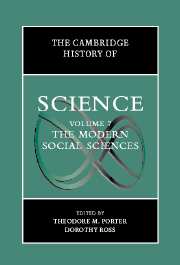Book contents
- Frontmatter
- 1 Introduction: Writing the History of Social Science
- PART I SCIENCES OF THE SOCIAL TO THE LATE NINETEENTH CENTURY
- 2 Genres and Objects of Social Inquiry, From the Enlightenment to 1890
- 3 Social Thought and Natural Science
- 4 Cause, Teleology, and Method
- 5 Utopian Socialism And Social Science
- 6 Social Surveys in the Eighteenth and Nineteenth Centuries
- 7 Scientific Ethnography and Travel, 1750–1850
- 8 History and Historicism
- 9 Bringing the Psyche into Scientific Focus
- 10 Continental Political Economy From the Physiocrats to the Marginal Revolution
- 11 British Economic Theory From Locke To Marshall
- 12 Marx and Marxism
- PART II THE DISCIPLINES IN WESTERN EUROPE AND NORTH AMERICA SINCE ABOUT 1880
- PART III THE INTERNATIONALIZATION OF THE SOCIAL SCIENCES
- PART IV SOCIAL SCIENCE AS DISCOURSE AND PRACTICE IN PUBLIC AND PRIVATE LIFE
- Index
- References
12 - Marx and Marxism
from PART I - SCIENCES OF THE SOCIAL TO THE LATE NINETEENTH CENTURY
Published online by Cambridge University Press: 28 March 2008
- Frontmatter
- 1 Introduction: Writing the History of Social Science
- PART I SCIENCES OF THE SOCIAL TO THE LATE NINETEENTH CENTURY
- 2 Genres and Objects of Social Inquiry, From the Enlightenment to 1890
- 3 Social Thought and Natural Science
- 4 Cause, Teleology, and Method
- 5 Utopian Socialism And Social Science
- 6 Social Surveys in the Eighteenth and Nineteenth Centuries
- 7 Scientific Ethnography and Travel, 1750–1850
- 8 History and Historicism
- 9 Bringing the Psyche into Scientific Focus
- 10 Continental Political Economy From the Physiocrats to the Marginal Revolution
- 11 British Economic Theory From Locke To Marshall
- 12 Marx and Marxism
- PART II THE DISCIPLINES IN WESTERN EUROPE AND NORTH AMERICA SINCE ABOUT 1880
- PART III THE INTERNATIONALIZATION OF THE SOCIAL SCIENCES
- PART IV SOCIAL SCIENCE AS DISCOURSE AND PRACTICE IN PUBLIC AND PRIVATE LIFE
- Index
- References
Summary
Karl Marx (1818–1883) absorbed and modified, but never rejected, a German intellectual tradition concerning knowledge and science. This tradition, of science as Wissenschaft, derives from idealist assumptions about language and truth that contrast with the empiricism of common English usage and of Anglo-American philosophies of science. Moreover, Marx’s concept of social science was explicitly political, as was his activity as a social scientist, in contrast to views that social science can be “above politics” or “balanced,” that the social scientist can be apolitical or at least neutral between competing political positions. Because of these differences, Marx and Marxism are frequently located as a “Marxist” section or alternative within the various disciplines that have come to constitute the social sciences since his time, although in specific national contexts the social sciences have sometimes been constituted largely within a Marxist frame of reference (e.g., in France) or against a notion of what is Marxist (e.g., in the United States). Yet it is also undeniable that Marxist social science, both substantively and methodologically, has had such a considerable influence on social science generally, and on philosophies of science overall, that the saying “we are all Marxists now” is almost a truism.
WISSENSCHAFT
In the German tradition, Wissenschaft refers to knowledge in the broadest sense, provided that it is conceptualized in a systematic way. Thus, the natural or physical sciences (Naturwissenschaften) and the social or human sciences (Geisteswissenschaften) do not necessarily form separate domains of knowledge derived through distinct methodologies, nor is philosophy strictly distinguished from science in terms of method or content.
- Type
- Chapter
- Information
- The Cambridge History of Science , pp. 183 - 202Publisher: Cambridge University PressPrint publication year: 2003
References
- 2
- Cited by



